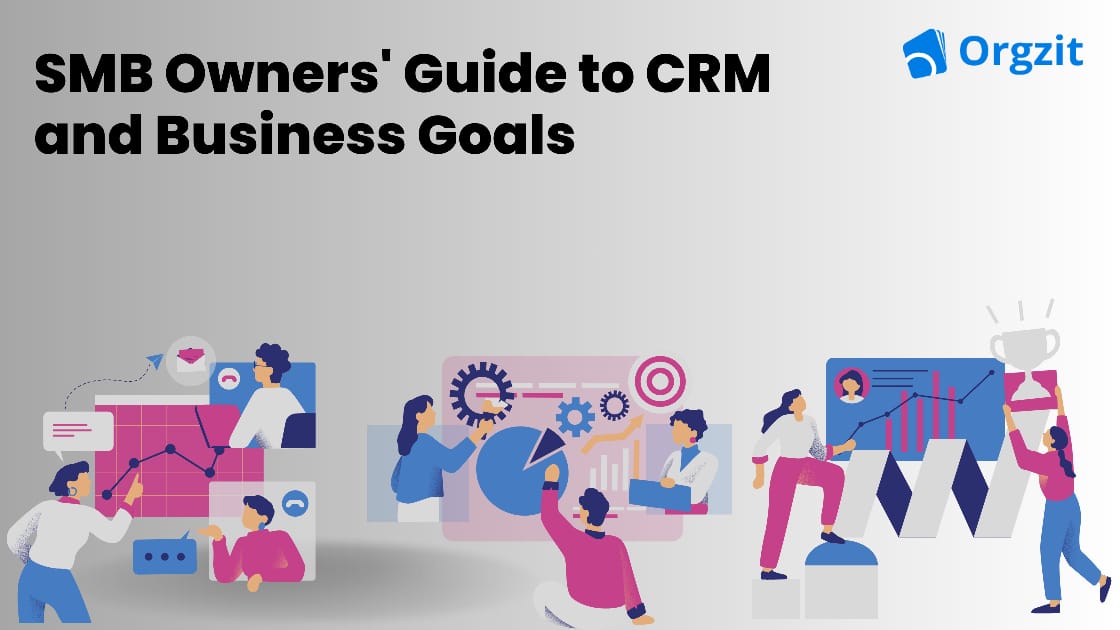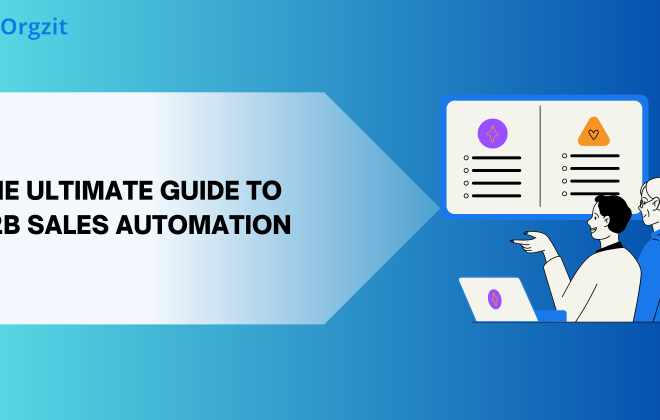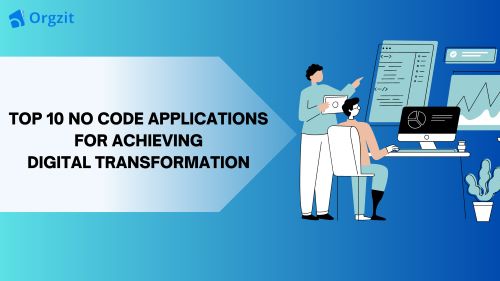5 Obstacles Blocking Your Business Success
Imagine yourself enjoying a worry-free vacation without stressing about task management, sales pipeline optimization, customer satisfaction, and your business’s many other operations, even in your absence.
Isn’t this a dream of yours and every other SMB owner?
Well, this wishful thinking can be your reality because a CRM can help you go all out in achieving all your business goals.
Read this article to learn more about how a CRM can assist you in achieving your business goals!
Introduction
Are you an SMB owner having the following business goals?
- Reaching more customers
- Increase customer retention
- Expand your brand
- Increase your product sales.
- Increase your revenue
Well, to achieve these objectives in a sustainable manner, you must put processes in place to get—and stay—organized.
As a business owner, your asset is your team and its productivity, which is always hampered by repetitive, mundane tasks done manually.
For them, spending hours updating Excel spreadsheets with contact information or manually sorting through stacks of business cards may work now, but it won’t last.
This is where CRM comes in. The right CRM software assists your company in meeting these objectives efficiently—no spreadsheets are required.
It can also grow alongside your company. This means you can put in place customer management processes that will last for a long time.
Understanding SMB Business Goals
A. Identifying Key Business Objectives
Simply put, a business objective is a measurable result that an organization aims to achieve.
As the organization grows, it is crucial to establish new business objectives on a regular basis in order to effectively track employee performance and ensure the business is progressing and improving.
Business objectives can also help you and your team members identify your strengths and areas for improvement.
Once you’ve determined these, you can implement new strategies to help improve your own performance, which contributes to overall organizational efficiency.
Some common business goals for every SMB owner are:
- Revenue Growth
- Customer Retention
- Operational Efficiency
- Market Expansion
Some other goals that cannot be missed are:
- Reduce Credit business with reminders and payment follow-up systems in place
- Unblock flow by finding high-margin selling products
- Expand product offerings to enhance cash flow diversity.
- Improve credit risk management by 10% by improving creditworthiness assessment procedures.
- Improve cash flow by negotiating better payment terms with key suppliers.
B. Setting Specific and Measurable Goals
SMART Goal method
Simply put, SMART goals are specific, measurable, and actionable. By using a series of five benchmarks that comprise the SMART method, you’ll be able to create concise goals and action steps that will keep you on track. Let’s look at an example to understand the difference between a vague goal and a SMART goal.
How to set/identify business goals relevant to you through the SMART method?
Vague goal: I aim to boost our company’s performance this quarter.
SMART goal:
Defining clear targets and establishing timelines are the most crucial parts of setting relevant and achievable business goals. Let’s understand it with an example;
- Ex. By the end of this quarter, convert 100 leads, a 20% boost from last quarter.
- Specific: Your goal must focus on one clearly defined metric.
- Measurable: You must measure your goal against that defined metric.
100 leads into customers.
- Attainable: You need to be able to achieve the goal within a specific timeframe.
Previous quarter 80, this quarter more efforts, 100
- Relevant: Your goal aligns with your company’s values and objectives. The purpose is to boost revenue.
- Timely: Specify when you can achieve these results.
By the end of this quarter.
How to Measure CRM Goals
Now that we’ve explored the business goals you can achieve with a CRM, let’s take a look at how you can measure your CRM goals.
- Customer Turnover Metric: helps you track the number of customers you have lost in a given time period.
This metric enables you to measure and analyze your customer retention and churn rate.
- Customer Acquisition Cost: The cost of customer acquisition is one of the most important metrics you need to be aware of. A low customer acquisition cost will let you acquire more customers and increase your revenue.
For example, if your CRM goal gives you 100 leads and you make only 20 sales, that’s a Won Lead Index of 5.Net Promoter Score (NPS) Used to measure your customer loyalty.
The calculation is: NPS Score =% of Promoters –% of Detractors. A high NPS score will help you improve your customer loyalty.
- Customer Effort Score (CES): Measures the customer’s experience in getting their queries answered or issues resolved. A high CES will help you improve your customer satisfaction and customer relationships.
- Expansion Revenue: This metric refers to the amount of revenue a company generates from existing customers through upselling and cross-selling.
Why are business goals important?
Developing a solid business objective is critical for your organization because it:
- Guidance for Decision-Making: Goals act as a compass, guiding SMB owners in decision-making processes and ensuring that choices align with the overarching objectives.
- Performance Evaluation: Goals provide tangible criteria to evaluate business performance, allowing SMB owners to assess achievements and identify areas for improvement.
- Employee Alignment: Clearly defined goals help align employees with the company’s mission, fostering a sense of purpose and unity within the workforce.
- Resource Optimization: Goals assist in prioritizing resource allocation, allowing SMB owners to focus on activities that contribute most to goal attainment.
- Strategic Planning: Goals serve as a foundation for strategic planning, enabling SMB owners to anticipate challenges and growth plans and adapt to market dynamics.
- Competitive Positioning: SMB owners can leverage goals to identify unique strengths, positioning their business competitively within the market.
- Financial Accountability: Goals aid in financial management by setting targets for revenue, profit margins, and cost control, ensuring fiscal responsibility.
- Risk Mitigation: Clearly defined goals facilitate the identification and mitigation of potential risks, enhancing the business’s ability to navigate uncertainties.
Problems in achieving these goals
- Mismanagement can hinder SMBs by causing confusion, inefficiencies, and decision-making errors. Inadequate resource management, including personnel and finances, can lead to disorganization and poor performance.
- Data storage issues can hamper SMBs because they may struggle with accessing, managing, and securing their data. Data loss, limited scalability, and limited data-driven decision-making are all possible outcomes of inefficient storage solutions.
- Manual processes frequently slow down SMB operations, resulting in lower productivity. Time-consuming tasks increase the likelihood of errors, limit scalability, and make it difficult for businesses to respond quickly to market changes. Automation is critical for streamlining processes and increasing efficiency.
- Limited Technology Integration: Many SMBs face challenges in integrating new technologies into their existing systems. This limitation can hinder efficiency, inhibit data flow between different departments, and impede the adoption of innovative solutions that could enhance productivity and competitiveness.
- Inadequate cybersecurity measures expose SMBs to significant risks. Cyber threats, such as data breaches and ransomware attacks, can have severe consequences, including financial losses and damage to reputation. SMBs often struggle to invest in robust cybersecurity infrastructure, making them vulnerable to evolving digital threats.
These issues, when combined, create roadblocks for SMBs in achieving their business goals, affecting their competitiveness and ability to adapt to fast-paced business environments.
How can implementing a CRM help you achieve these goals?
Picture this: A small retail business struggling with multiple issues like mismanagement, manual processes, limited technology integration, etc. They decided to implement a CRM system to address the challenges given below:
Before CRM
- Customer data is scattered across spreadsheets, making it challenging to access and update information efficiently.
- Order processing, inventory management, and customer communication are mostly manual, leading to delays and errors.
- Sales, marketing, and customer service teams work in silos, leading to disjointed communication and inconsistent customer experiences.
- The retail system operates independently of other business tools, hindering adaptability and efficiency.
- Concerns about customer data security exist due to reliance on basic security measures.
With CRM
- After buying and implementing a CRM, the customer data was centralized, improving accuracy and accessibility.
- It automates order processing, updates inventory, and triggers communication for order confirmations and shipment notifications.
- The CRM provided you and your team with a shared platform to access customer information, ensuring a customer-centric approach across departments.
- It even integrated seamlessly with existing systems, accounting software, and marketing tools, enhancing efficiency and adaptability.
- It offers you robust security features, including encryption and access controls, ensuring customer data protection and building trust.
Thus, implementing a CRM system transforms the SMB’s operations by addressing and solving numerous issues. This holistic approach contributes to achieving their business goals more effectively.
To further understand what implementing a CRM can do for your small business and how to choose the right one, read here:
Aligning CRM Features with Industry-Specific Goals
Which industry’s specific goals need a CRM?
Implementing a CRM system is guaranteed to benefit your company, no matter what industry it’s in. Industries that rely on CRM systems for their day-to-day operations include, but aren’t limited to…
| INDUSTRIES | SPECIFIC GOALS and PURPOSES |
| Healthcare and pharmaceutical | Keeping track of patient medical histories and previous visits and keeping a tab on the sale of drugs. |
| E-Commerce | Reaching out to new customers, send email campaigns, and keep in touch with existing customers. |
| Finance services | To store and organize data and generate new leads and prospects. |
| Hospitality, travel and tourism | To keep track of room reservations and previous bookings and send out promotional emails. |
| Agriculture | For various sales processes and lead generation |
| HR | To keep an organized database of employees, track their activity, and schedule one-on-one calls. |
| Call centres | To support customers, place cold sales calls, or generate new leads to call. |
| Consulting | To manage client projects, track billable hours, and facilitate timely communication. |
| Advertising agencies | To keep track of client campaigns and feedback and meet deadlines. |
| Legal firms | To manage case information and client appointments while automating follow-up reminders. |
| Architectural firms | To coordinate project timelines, client meetings, and document sharing. |
| IT sector | To generate new leads, provide the IT company with new deals and send out marketing emails. |
Generally, any industry that needs to keep track of its current and previous customers constantly generates new leads and provides constant support to clients.
Conclusion
Finally, a CRM system can help SMB owners achieve their business goals by streamlining processes, increasing efficiency, and providing a centralized platform for effective customer management.
Businesses can overcome challenges and position themselves competitively in the market by setting SMART goals, measuring relevant metrics, and aligning CRM features with industry-specific needs.
A comprehensive approach to CRM implementation contributes significantly to the long-term success and sustainability of SMBs across diverse industries.
To learn more about CRM, its implementation, and how it can solve all your business problems, connect with us for a free demo session at orgzit.com/book-demo
FAQS
Try to set precise goals.
Putting in dates, times, and amounts while setting a business goal will help you measure and evaluate your achievement.
The fundamental goal of a CRM is to develop and maintain long-term dependencies and relationships between firms and their customers.
CRM software allows your business to collect, store, and manage your customers’ data. You can mine this data for insights, use it to forecast future sales, and automate your marketing and sales processes.









